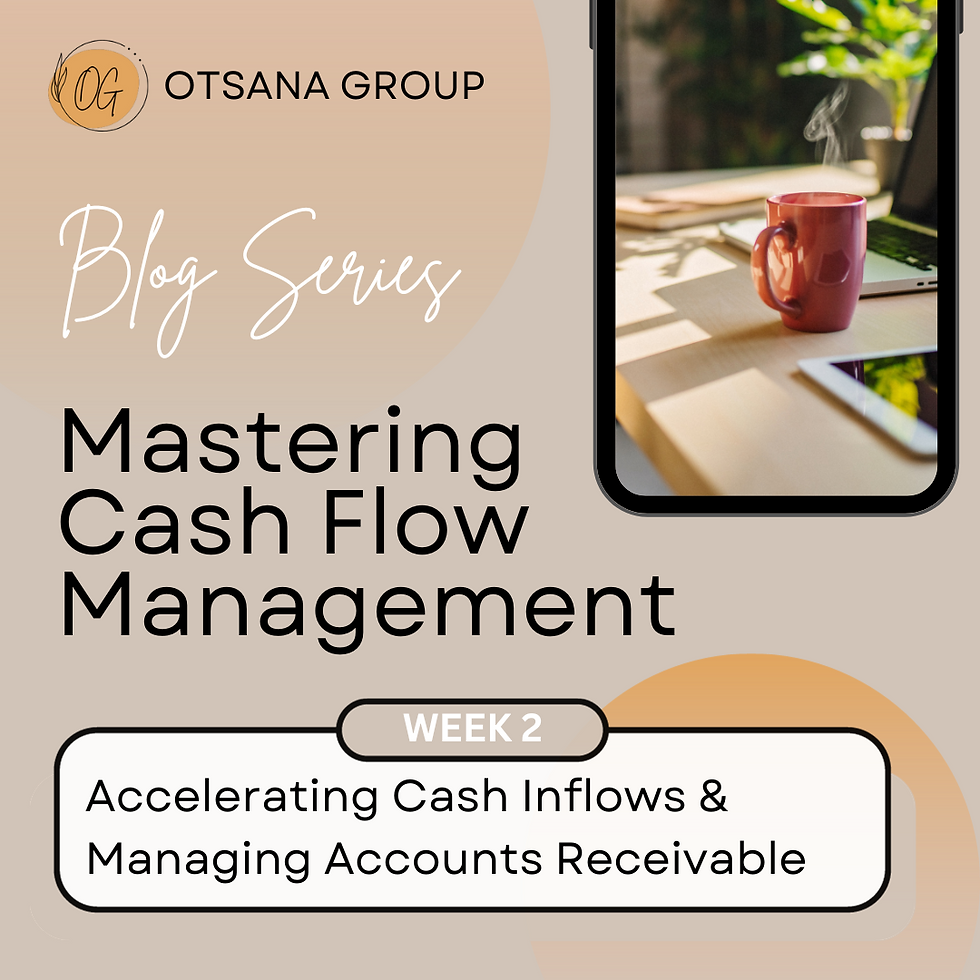Blog Series: Mastering Cash Flow Management
- otsanagroup
- Oct 16, 2023
- 4 min read
Week 3: Expense Control & Vendor Terms

Cash flow is the lifeblood of any business, and managing expenses is a critical aspect of financial management for any business. To optimise your financial health and ensure profitability, you need to have a tight grip on your expenses. Another effective way to exercise control over cash flow in relation to your expenditures is by leveraging vendor terms.
In this blog post, we'll explore the importance of expense control and how smart management of vendor terms can make a significant impact on your bottom line.
Expense Control
Why it Matters
Effective expense control is vital for the following reasons:
Financial Stability: Controlling expenses ensures that your business remains financially stable, reducing the risk of running into financial difficulties.
Profitability: Lower expenses translate to higher profits. By cutting unnecessary costs, you can improve your profit margins.
Investment Opportunities: The funds saved from expense control can be reinvested in the business for growth, innovation, and new opportunities.
Competitive Advantage: Efficient expense management allows you to be more competitive by offering competitive prices to customers or investing in quality improvements.
Tips for effective expense control
Budgeting and Planning:
- Develop a comprehensive budget that outlines expected income and allocates funds to different expense categories.
- Regularly review and update the budget based on actual performance and changing business conditions.
Expense Tracking:
- Implement a robust expense tracking system to record all business-related expenses accurately.
- Categorise expenses (e.g., utilities, salaries, supplies) to understand where money is being spent and identify areas for potential savings.
Prioritise Expenses:
- Distinguish between essential and non-essential expenses.
- Prioritise spending on necessities that directly contribute to business operations and growth.
Negotiate with Suppliers:
- Negotiate with suppliers for better terms, discounts, or bulk purchase deals to reduce the cost of goods and services.
Review Contracts and Agreements:
- Regularly review contracts with vendors, service providers, and landlords to ensure terms and rates are still competitive and beneficial to your business.
Optimise Staffing Costs:
- Assess workload and allocate resources efficiently to avoid overstaffing or underutilising employees.
- Consider flexible work arrangements, outsourcing, or contract workers during peak periods to manage labour costs effectively.
Expense Approval Process:
- Implement a clear expense approval process to ensure all expenses align with the budget and business needs.
- Encourage employees to be mindful of costs and seek approval for necessary expenditures.
Monitor Travel and Accommodation Costs:
- Encourage employees to book travel and accommodations in advance to secure better rates and reduce last-minute costs.
- Use technology to track travel expenses and ensure compliance with company policies.
Remote Work:
- Embrace remote work arrangements where feasible to reduce expenses related to office space, utilities, and other overheads.
Energy and Resource Conservation:
- Implement energy-saving practices to reduce utility bills, such as turning off lights and electronics when not in use or using energy-efficient appliances.
Evaluate Technology Costs:
- Regularly review software subscriptions and technology services to determine if they are still necessary and cost-effective for your business needs.
Employee Training and Development:
- Opt for cost-effective training options, such as online courses or in-house training programs, to develop employee skills without overspending.
Monitor and Analyse Expenses:
- Use financial software and tools to regularly analyse expense data, identify spending patterns, and pinpoint areas for potential cost reductions.
Cross-Department Communication:
- Encourage open communication between departments to share cost-saving ideas and collaborate on finding efficient solutions.
Set Savings Targets:
- Establish specific expense reduction targets and motivate your team to work towards achieving those targets.
Consistent monitoring and a proactive approach to expense management will help your business maintain financial stability and improve profitability over time.
Vendor Terms
Understanding Vendor Terms
Vendor terms refer to the negotiated payment conditions that a business establishes with its suppliers or vendors. These terms dictate how and when payments for goods or services are made. Proper management of vendor terms can significantly impact your cash flow and overall financial health.
Leveraging Vendor Terms for Expense Control
Here are some strategies to harness vendor terms for effective expense control:
Negotiate Favourable Terms: When entering into agreements with vendors, negotiate terms that align with your cash flow. For example, negotiate longer payment periods to keep more cash in your business for a longer time.
Early Payment Discounts: Conversely, explore opportunities for early payment discounts. Some vendors offer discounts for prompt payment. Taking advantage of these discounts can result in cost savings.
Payment Scheduling: Time your payments strategically. Pay vendors on the last day of the agreed-upon payment period to maximise the use of your cash.
Vendor Selection: Choose vendors carefully. Consider their terms, pricing, quality, and reliability. Selecting vendors with favourable terms can be a crucial part of your expense control strategy.
Invoice Accuracy: Ensure that vendor invoices are accurate and match the terms agreed upon. Discrepancies can lead to overpayments or payment delays.
Regular Vendor Reviews: Periodically review your vendor relationships. If you consistently have excellent payment history, you may be able to negotiate even more favourable terms.
Consolidate Vendors: Reducing the number of vendors can simplify payment management and may provide opportunities for volume discounts.
Use Technology: Implement expense management software to track and manage vendor payments efficiently.
Conclusion
Expense control is a cornerstone of financial stability and growth for businesses. Managing expenses effectively can free up capital, enhance profitability, and create a more resilient financial position. One of the most powerful tools in your expense control toolkit is the strategic management of vendor terms. By negotiating, scheduling, and selecting vendors wisely, you can optimize your cash flow and expenses. In today's competitive business environment, the ability to manage expenses and vendor terms effectively can be a game-changer, allowing your business to thrive and prosper.




Comments